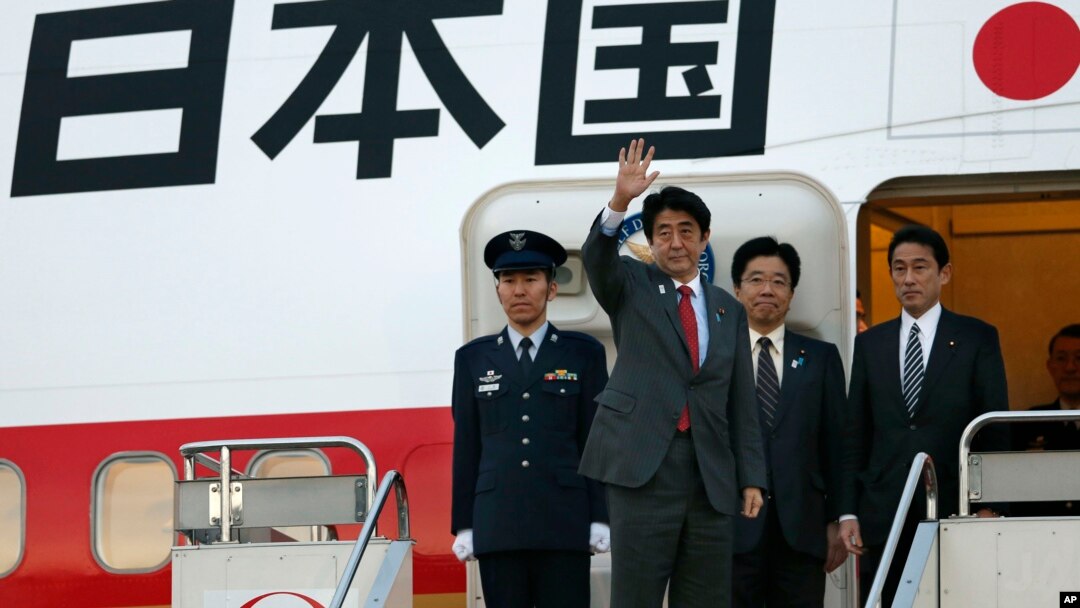Japanese Prime Minister Shinzo Abe is accusing China of using its state-run school system to encourage anti-Japan sentiment, thereby worsening the two countries' territorial disputes.
On the eve of his visit to Washington, Prime Minister Abe said, in an interview with the Washington Post, that China has a "deeply ingrained" need for conflict with Japan and its other neighbors. He says Beijing uses the disputes to maintain strong domestic support. Because of this, he says it is not likely the differences will be resolved anytime soon.
During his meeting Friday with President Barack Obama, Abe is expected to seek expanded defense cooperation with Washington to help counter perceived threats from China's territorial claims.
Japan-China ties have sunk to their lowest level in years because of a worsening dispute about a group of remote East China Sea islands that lie near strategic fishing grounds and potential oil deposits. Both countries claim the islands.
Japan purchased some of the uninhabited islands from their private Japanese landowner late last year, prompting official condemnation from Beijing and days of violent anti-Japan protests throughout China.
Since then, China has conducted regular patrols near the islands, in what is seen as an attempt to challenge Japan's administration of the disputed territory. Both countries have also sent fighter jets to the islands, raising fears of a conflict between the two Asian powers.
Abe told the Post that U.S. presence in Asia is "critical" to prevent China from taking similar steps against other countries with which it has maritime disputes. He says it is important to make China realize they cannot "change rules" or "take away" someone's territory "by coercion or intimidation."
The 58-year-old leader, who began his second turn as prime minister in December, has promised to get tough on China and is known for his nationalistic views. He says such views in China are dangerous, arguing that teaching patriotism in China is equivalent to "teaching anti-Japanese sentiment."
On the eve of his visit to Washington, Prime Minister Abe said, in an interview with the Washington Post, that China has a "deeply ingrained" need for conflict with Japan and its other neighbors. He says Beijing uses the disputes to maintain strong domestic support. Because of this, he says it is not likely the differences will be resolved anytime soon.
During his meeting Friday with President Barack Obama, Abe is expected to seek expanded defense cooperation with Washington to help counter perceived threats from China's territorial claims.
Japan-China ties have sunk to their lowest level in years because of a worsening dispute about a group of remote East China Sea islands that lie near strategic fishing grounds and potential oil deposits. Both countries claim the islands.
Japan purchased some of the uninhabited islands from their private Japanese landowner late last year, prompting official condemnation from Beijing and days of violent anti-Japan protests throughout China.
Since then, China has conducted regular patrols near the islands, in what is seen as an attempt to challenge Japan's administration of the disputed territory. Both countries have also sent fighter jets to the islands, raising fears of a conflict between the two Asian powers.
Abe told the Post that U.S. presence in Asia is "critical" to prevent China from taking similar steps against other countries with which it has maritime disputes. He says it is important to make China realize they cannot "change rules" or "take away" someone's territory "by coercion or intimidation."
The 58-year-old leader, who began his second turn as prime minister in December, has promised to get tough on China and is known for his nationalistic views. He says such views in China are dangerous, arguing that teaching patriotism in China is equivalent to "teaching anti-Japanese sentiment."


